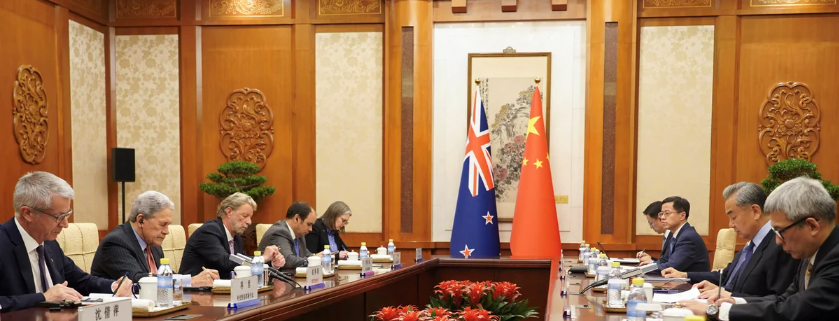
New Zealand’s foreign minister, Winston Peters, expressed concerns over China’s recent live-fire drills in the Tasman Sea during high-level meetings with Chinese leaders on Wednesday, criticizing the lack of prior notice given to New Zealand.
Peters, speaking to reporters in Beijing after discussions with Chinese foreign minister Wang Yi and vice-premier Han Zheng, described the situation as a lapse in diplomatic relations.
“This is a failure in [our special relationship] at this time, and we’d like to have it corrected into the future,” Peters stated.
Diplomatic Tensions Over Military Drills
During the meeting, Wang emphasized the importance of trust between China and New Zealand and urged resolving differences through dialogue, according to a readout from China’s foreign ministry.
Peters’ visit comes amid strained relations following China’s military exercises in international waters between New Zealand and Australia. Officials from both nations criticized China for providing minimal notice, causing commercial airlines to reroute flights.
New Zealand’s defense minister, Judith Collins, told Radio New Zealand that China had given only “a couple of hours’ notice” instead of the usual 12 to 24 hours required for airlines to plan alternative routes.
Australia voiced even stronger objections, with foreign minister Penny Wong raising the issue with Wang during their recent meeting in Johannesburg at the G20 foreign ministers’ summit.
Meanwhile, China’s state-run Xinhua news agency omitted any mention of the drills in its initial report on Peters’ meeting with Han earlier in the day.
According to the New Zealand Defense Force, three Chinese naval vessels had been operating south of Tasmania within Australia’s exclusive economic zone and were now moving westward.
Concerns Over China’s Pacific Presence
Peters also brought up China’s missile launch test last September, which landed near French Polynesia’s exclusive economic zone. He noted that “most Pacific Island nations got no warning at all” and that New Zealand had received “little warning.”
China is reportedly considering improving its advance notifications for future military drills, Peters added.
During talks in Beijing, discussions also touched on the potential return of Donald Trump to the White House. Peters revealed that the topic came up more frequently than expected but refrained from sharing specifics, saying both sides agreed to “wait and see what happens when the dust settles.”
Another key issue was the Cook Islands’ recent agreements with China. Peters criticized the self-governing Pacific nation for failing to consult adequately with New Zealand before signing a comprehensive strategic partnership and other deals with Beijing.
China “needs to understand the constitutional arrangement” between New Zealand and the Cook Islands, Peters emphasized, adding that New Zealand had received more information from China about the agreements than from the Cook Islands itself.
Peters previously stated that New Zealand must “reset” its relationship with its Pacific neighbor due to concerns over China’s expanding influence in the region.
The agreement covers education, the economy, infrastructure, fisheries, disaster management, and seabed mining—triggering alarm in New Zealand over China’s growing footprint in the Pacific and its potential security implications.
Wang responded by affirming that China respects New Zealand’s traditional ties with Pacific nations.
The Cook Islands, while self-governing, maintains a free association with New Zealand, sharing a head of state and citizenship rights. It retains an independent foreign policy but is required to consult with New Zealand on matters of security, defense, and foreign policy.
Trade and Economic Cooperation
Beyond security concerns, Peters and Wang also discussed trade and economic issues, with Wang encouraging collaboration in emerging industries such as artificial intelligence and green energy.
China remains New Zealand’s largest trading partner, accounting for approximately a quarter of New Zealand’s total exports in 2024.